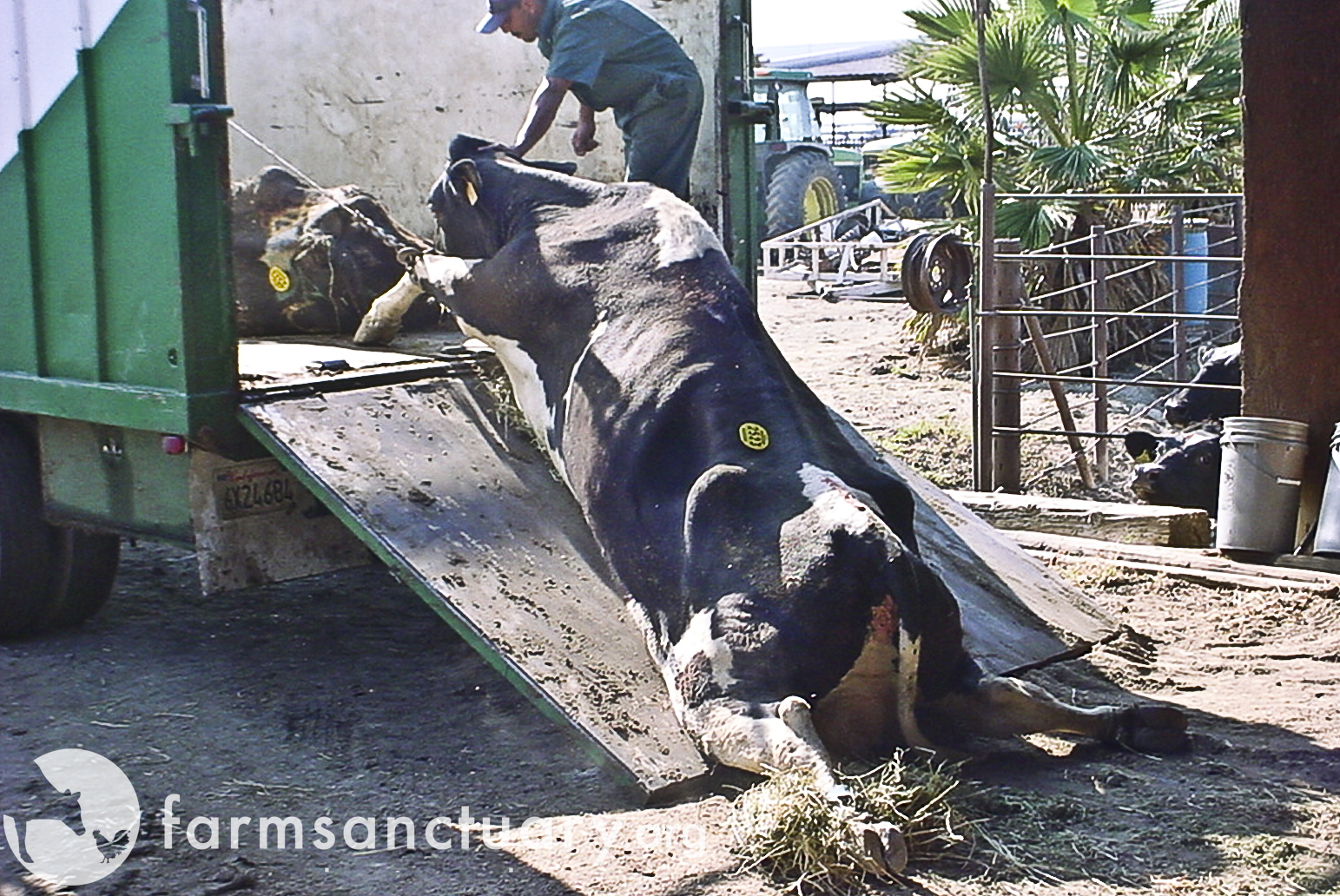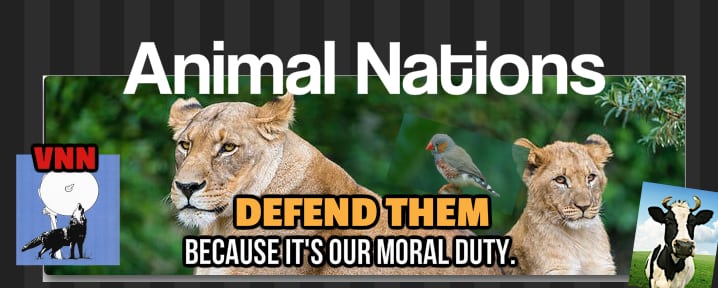Patrice Greanville
|
For one thing, the consequences of speciesism are, by any measure, far graver to the vast majority of the beings classified under this category than those suffering under sexism or racism. This is not to minimize the horrible suffering that both women and people of color have been subjected to down the ages, and which in many areas and cultures of the world continue to suffer; it is just to point out that the level of victimization has never involved their being raised, on purpose, for certain early death, nor to be killed for recreational purposes, among many morally repugnant uses humans routinely assign to animals by dint of their categorization as “inferior beings”—a categorization, we might add, based on unilateral declarations of moral and intellectual superiority. Astute students of history will easily recognize the parallels with fascism, especially its German strain, Nazism, whose ideology of the master race served to legitimate widespread persecution and annihilation of “inferior breeds.” The roots of speciesism sound innocuous enough. Speciesism involves assigning different values or rights to beings on the basis of their species. The term was coined by Richard D. Ryder in 1970 and is used to denote prejudice similar in kind to sexism and racism. The term has not entered everyday language. Mind-boggling dimensions Roughly 200 thousand million animals—yes, 300 billion creatures (1)—are estimated to die each year as a result of human activities ranging from factory farming to hunting, the fur garment trades, commercial exploitation of various kinds, the superexploitation of the oceans, and biomedical research. That’s more than 820 million creatures every single day, including birds, cows, and hogs, all of them highly sociable animals, and, try wrapping your mind around this figure: 34,246,575 animals per hour. Well that’s a rough approximation. No one really knows the exact number of victims, but it surely exceeds the available data.  The dynamic of business is implacable and by definition amoral. Compassion or due respect for humans, nonhumans, and nature itself, seen as mere factors of production for profit do not enter the basic calculus. This is a downed cow, being dragged to slaughter. Happy burgers! Click on this image. (Credit: Farm Sanctuary, Flickr) The way we go about killing animals, wherever they may be found or kept, land, sea or air—murdering and torturing are often better words—is astonishing. We do it with abandon and we do it in such institutionalized, “traditional” ways that only a minority ever realize the extent of the tragedy. Indeed, many ghastly forms of animal suffering around the world are rooted in “revered traditions.” This is one of the reasons why conservatives who care for animals live a contradiction, for it is a demonstrable fact that—while not perfect— as society moves forward, raising the economic and educational standard of the masses, the chances increase for the sensitization of the public to the plight of animals. Since the era of modern fishing began 200 years ago we have decimated the oceans, ostensibly infinite reservoirs of life, converting many maritime regions into what Farley Mowat accurately decried as “seas of slaughter.” In the USA alone, every year in excess of 50 million turkeys are killed just for Thanksgiving Day, to commemorate a date that is of questionable historical merit, and which, despite the fact that the sacrificial victims have grown from a symbolic handful to tens of millions, rarely stirs any introspection. Sadly, such incidents are but a mere drop in an invisible sea of abuse whose actual roots date back to our earliest times as a species with self-righteous “dominionistic” claims over nature. Three hundred billion animals is a stunning, horrible figure, yet this figure does not include animals mistreated or dead as a result of indirect anthropogenic causes: habitat destruction, widespread pollution, apparently “harmless” recreational activities such as sport fishing and boating, and the collision of animals with “modernity” (up to 250 million animals are thought to die annually as roadkill on the American highways alone or collide against high wires and skyscrapers). Not to mention, as previously mentioned, the massive die-off already in progress as a result of climate change. We have become indeed not only the most appalling tyranny over every other sentient creature on this planet, including many segments of our own breed, but also a raging, self-righteous cancer extending itself with impunity to every corner of the earth. Time to do some rethinking [dropcap]T[/dropcap]oday, as a result of an amoral industrialism, ecological deterioration (especially acute in the age of human-triggered global climate change) and other related issues, self-defined progressives can’t afford to go on pretending that suffering on such egregious scale is just a peripheral issue, or the concern of affluent dilettantes with little interest in other social issues. Due to a deeply embedded and largely unexamined 18th Century heritage of philosophical “superhumanism” (“man is the measure of all things”) which, we should recall, arose as a response to a greater form of human obtuseness, the one granting Gods and Kings total control over human agency), most people—whether on the “left” or the “right” continue to endorse or acquiesce in human supremacist attitudes toward animals. This moral blindness is inexcusable for those who wish to be seen as the moral vanguard of humanity.
The bottom line is that speciesism—an underhanded and primitive form of fascism applied to animals and nature in general—is by far the oldest and most pervasive form of brutal tyrannisation known on our planet. I don’t use the word “fascism” as hyperbole in this context or for dramatic effect. I wish it were hyperbole. But the fact is that fascism is distinguished—inter alia—for its unilateral proclamations of superiority by a certain race or breed, with such spurious superiority endowing said race with the “right” to dominate, exploit, and annihilate at will any group deemed “inferior.” If that doesn’t describe eloquently our despicable behavior toward non-human animals, I don’t know what does.  Jim Perdue, head of Perdue Farms, is a conglomerator whose ads have the audacity to suggest he is a friend of the animals he victimizes by the hundreds of millions. Contrary to what we might expect, arguing for animal rights among progressives frequently strikes a vein of resentment, and invidious commentary. Many find it odious to classify animals as victims on the same footing as women or non-whites (whatever that is since there’s no real scientific base for race distinctions). Such voices, regrettably mired in their own deeply embedded speciesist thinking, view such imputed equivalency as an insult to their own victim status, or as a call to divert scarce energies away from the focus on their struggles. The upshot is usually a torrent of jealousy-tinged vituperation for those who would dare assign any type of primacy to animal liberation. Speciesism—an underhanded and primitive form of fascism applied to animals and nature in general—is by far the oldest and most pervasive form of brutal tyrannisation known on our planet. Overcoming it (if we don’t destroy the planet first) will likely become the last great moral struggle for humanity.
I know this from personal experience. I’ve been both an animal liberationist and a leftist all my life, so I know the score, and what I’m saying here is that I am resigned, I expect to see sarcasm, derision, flippancy, intellectual laziness, and, why not, even intellectual dishonesty in the ranks of those who define themselves as progressives, for such is the deep reservoir of human chauvinism that afflicts so many in our species. The more creative will hide their prejudices by feigning alarm at my conflating the words “fascism” with “speciesism.” Well, I have something to say to this easily offended crowd: Language should not be an obstacle when pusuing a broader justice. But what am I proposing here? Why so much opposition? Just think about it for a moment. This is something that all decent people should be for, an extension of compassion, or at least the benefit of the doubt when subjecting mind-boggling numbers of sentient creatures to the finality of death. In other words, I’m pleading for a reduction in the colossal amount of violence that this planet already sustains, the violence that at least our species is directly responsible for, a diminution in the sum total of unnecessary suffering inflicted across the globe…Where is the perversion of meaning there? The outrageous betrayal of the language? Or is it that by saying “fascism” and “speciesism” in one breath I manage to offend the sensibilities of too many purists who happen to land on my articles? Words change, expand, become obsolete, drop and add connotations and meanings, and sometimes die, like the things and realities they were initially created for. And besides, just like there are many varieties of capitalism, socialism and communism, so you also have distinct varieties of fascism. In some, all the bells and whistles are found that connote “classical fascism” —the jackboots, the open corporatization of the state, and so on and so forth, as we have come to know it. In others, it’s more of an all-encompassing worldview, a system of values, an ideology that justifies a malignant treatment code. But here’s the crux of the question, as some might say. The boots, the marches, the endless wars, the nauseating violence, the paraphernalia of fascism and the fascination with death—all of that cannot happen in the absence of an ideology that starts by justifying the oppression of others by virtue of a self-serving, unilateral declaration of superiority. The concept is the same; the contexts vary. Regrettably, human chauvinism cuts very deep and pervades every nook and cranny of what we optimistically still call civilization, and has done so for millennia. As noted earlier, no one is immune to this infection, including many folks who regard themselves as impeccably “progressive”. Indeed, I repeat, it is from their ranks that you often hear some of the worst and most derisive epithets. Scarce resources [dropcap]T[/dropcap]he usual argument is that progressives, always a thin line against barbarism, have better things to attend to than the fate of “mere” chickens and cows. Compassion, to such individuals, has obviously left the building; it is fungible, divisible, and comfortably apportionable according to inclusion or exclusion in certain categories of privileged sentience. They obviously don’t see—refuse to see—the parallels with so many other struggles they may have honored or participated in, nor do they see how the liberation of animals is an integral part of a serious environmentalist agenda. No, here they draw the line, and reason, kindness, and the most elementary fairness fly out the window.But such narrow-minded and intellectually lazy positions will surely be exposed—sooner rather than later—for the pretentious sham they truly are. For now, in the age of an utterly deranged industrialism, with a global system blatantly proclaiming as its organizing principle the pursuit at any cost of infinite growth in what to any sensible person is a very finite and fragile planet, the tyranny of humans over nature has acquired monstrous proportions. The colossal dimensions of animal exploitation by the industrial method and the death of one species after another grimly attest to that. In view of these incontestable facts, no one with a scintilla of sensibility should turn his or her back on such knowledge. It is the duty of all people who haven’t yet done so, and especially of progressives, to re-examine their assumptions about animals, about their everyday conduct in choosing food and clothing and transportation modes, and to join the last struggle against the first tyranny. By doing so, they will re-invigorate the environmental movement, rendering it less abstract and more passionate, because while fighting for nature is a noble and urgent call, fighting for nature’s oppressed creatures is a matter of long overdue justice. —PG The URL for this article is https://www.greanvillepost.com/2017/01/17/he-who-says-speciesism-says-fascism-abridgedupdated-version/ About the author (1) This is an estimate. Some analysts put the figure much higher, due to the almost impossibility of counting marine animal exploitation, others a bit lower. In either case this is a truly mind-boggling quantity of sentient creatures subjected to the horrors of death at the hands of humans, often for the most banal of purposes. |
Nauseated by the
vile corporate media?
Had enough of their lies, escapism,
omissions and relentless manipulation?
Send a donation to
The Greanville Post–or
But be sure to support YOUR media.
If you don’t, who will?







S/he who says speciesism say dominion….
Genesis 9:1-3 “The fear and dread of you shall rest on every animal of the earth, and on every bird of the air, on everything that creeps on the ground, and on all the fish in the sea; into your hand they are delivered. Every moving thing that lives shall be food for you; and just as I gave you the green plants, I give you everything.”
“Dominion is probably the single most dangerous lie ever created in the history of humankind. . . the root of all cruelty and evil..”Sharon Azar
We need a major shift away from dominion…. a broader, more encompassing ethic that has reverence for the lives of all beings, not just those that resemble man. Categorizing animals according to which are sentient according to human standards does not negate dominion, for it is still man controlling which animals are worthy of protection and which are not. Such an ethic is Ahimsa…. An organization guided by this ethic is Wildlife SOS India which recently rescued a scorpion… All living beings are part of the natural order and the cycle of life…. invalidating the lives of lesser animals, as… Read more »
In an otherwise excellent analysis of the dominion mind set, when you say: “I’m pleading for a reduction in the colossal amount of violence that this planet already sustains, the violence that at least our species is directly responsible for, a diminution in the sum total of ***unnecessary*** suffering inflicted across the globe…” the word unnecessary is an invocation of the effort to justify violence to animals based on their utility to man. That is dominion. When we value the lives of others in terms of our own needs, rather than respecting the inherent value of these lives we fall… Read more »
The commenter is WRONG. I do not mean to justify not by one iota any type of udominionistic practice or philosophy, which I completely reject. That’s the whole point of the article, that we practice FASCISM on animals, on the basis of our supposed “superiority”. When I say “unnecessary” I am speaking philosophically about the distinction between suffering that is AVOIDABLE and suffering that, with all our scientific knowledge, we cannot avid, or eliminate, as in the case of some terrible diseases which medical arts are not yet able to control. THAT is what I mean when I speak of… Read more »
Shorty, When you consider what the article is about, necessary suffering refers to the slaughter of 59 billion living beings/ year…. When the clause unnecessary is inserted, it provides an excuse, a reason, a justification to eat meat…. such as ‘I am not hiring anyone if I eat sustainable meat”, or As long as the animal is killed humanely it is ok to eat meat, or I may eat meat because the biblical verse gives me the right to do so: Genesis 9:1-3 “The fear and dread of you shall rest on every animal of the earth, and on every… Read more »
fact is, humans are the ultimate invasive species on the planet Earth..all due to our mistaken sense that we are above Nature. It is frustrating to live in a world where so many are blind to the sufferings of the most vulnerable population, the non human animals..The only hope I see-the one that keeps me sane and tempers my rage and anger is knowing there is a way out and forward; the way is Ahimsa. I repeat the word in my mind/heart; Ahimsa, Ahimsa, Ahimsa…and try to live by its principle.
Sharon,
Thank you for your comment. Your understanding and support of ahimsa is admirable.
As you know with ahimsa violence to animals is not legitimized with excuses & rationalizations. The goal of ahimsa is to avoid harm to other living beings…. man and animal.
Ruth
Shorty,
I wasn’t sure if my response was clear.to our comment was clear… so I will try to sum it up. If you distinguish between necessary and unnecessary violence to animals inflicted by man, then it is possible to justify or excuse slaughter and animal exploitation, when necessary for human benefit.
Necessary violence to animals than becomes a tolerable, legitimized evil, with moral impunity.
Ruth
I clarified this point in my earlier comment. I am NOT talking about anything concerning animal slaughter or cruelty, exploitation, etc. I am talking—philosophically—about the sum total of UNNECESSARY suffering that happens in this world by dint of human options, backwardness, and of course intent, on their fellow humans and nonhuman animals. “NECESSARY” (or UNAVOIDABLE) suffering concerns all the situations where no human can intervene to lessen the suffering via medical arts, solutions to problems, r any form of assistance. Cancers can fall in this category, to make this a bit more clear. My point then s that we should… Read more »